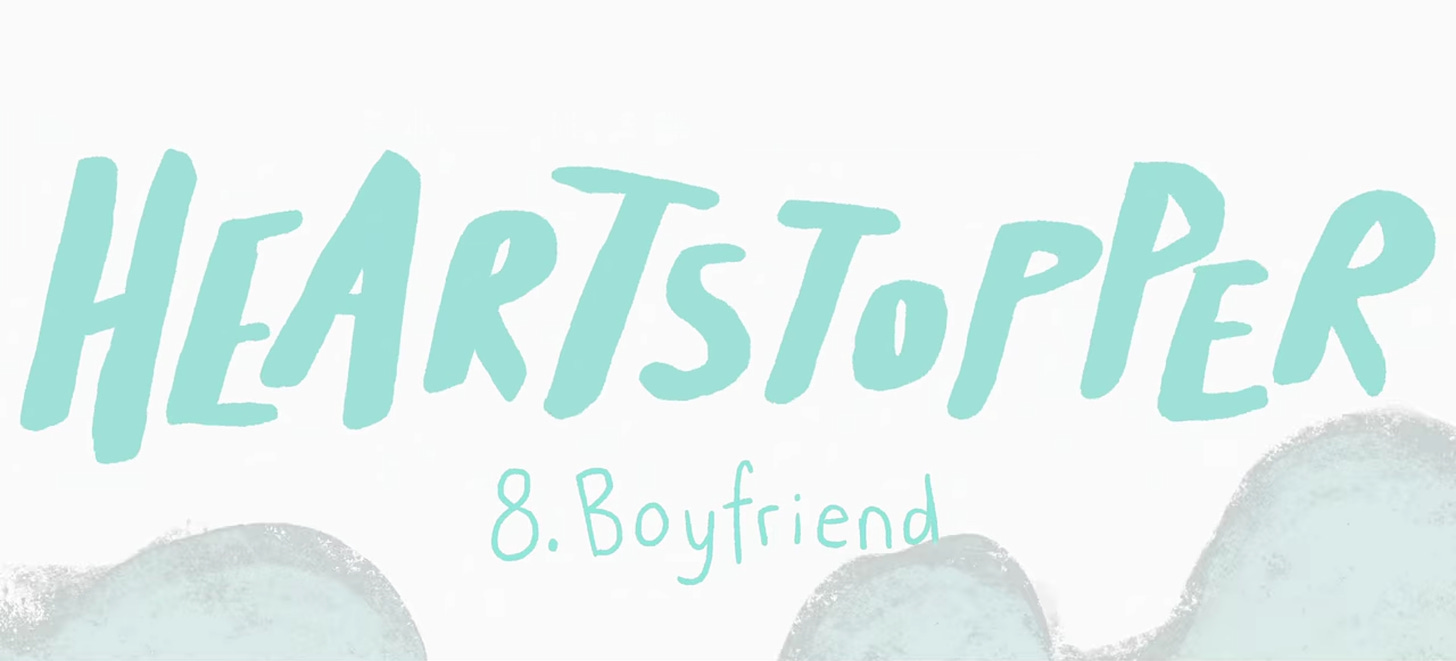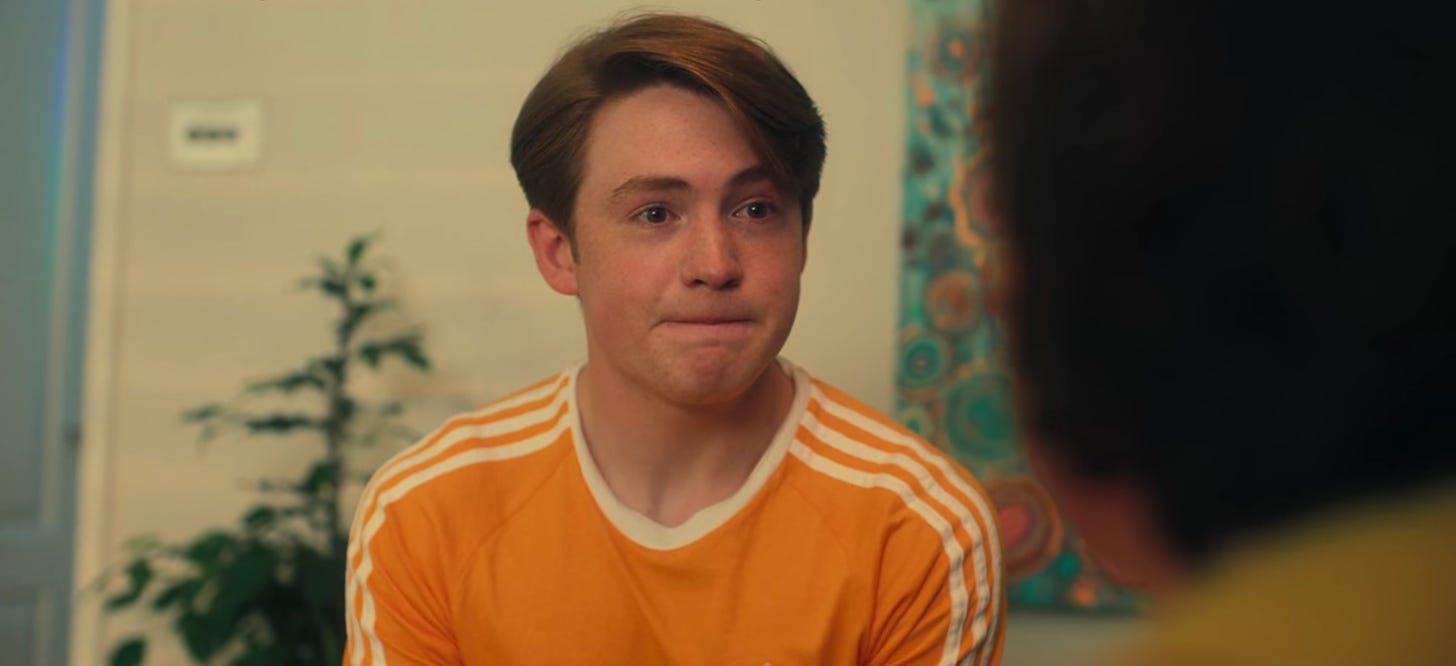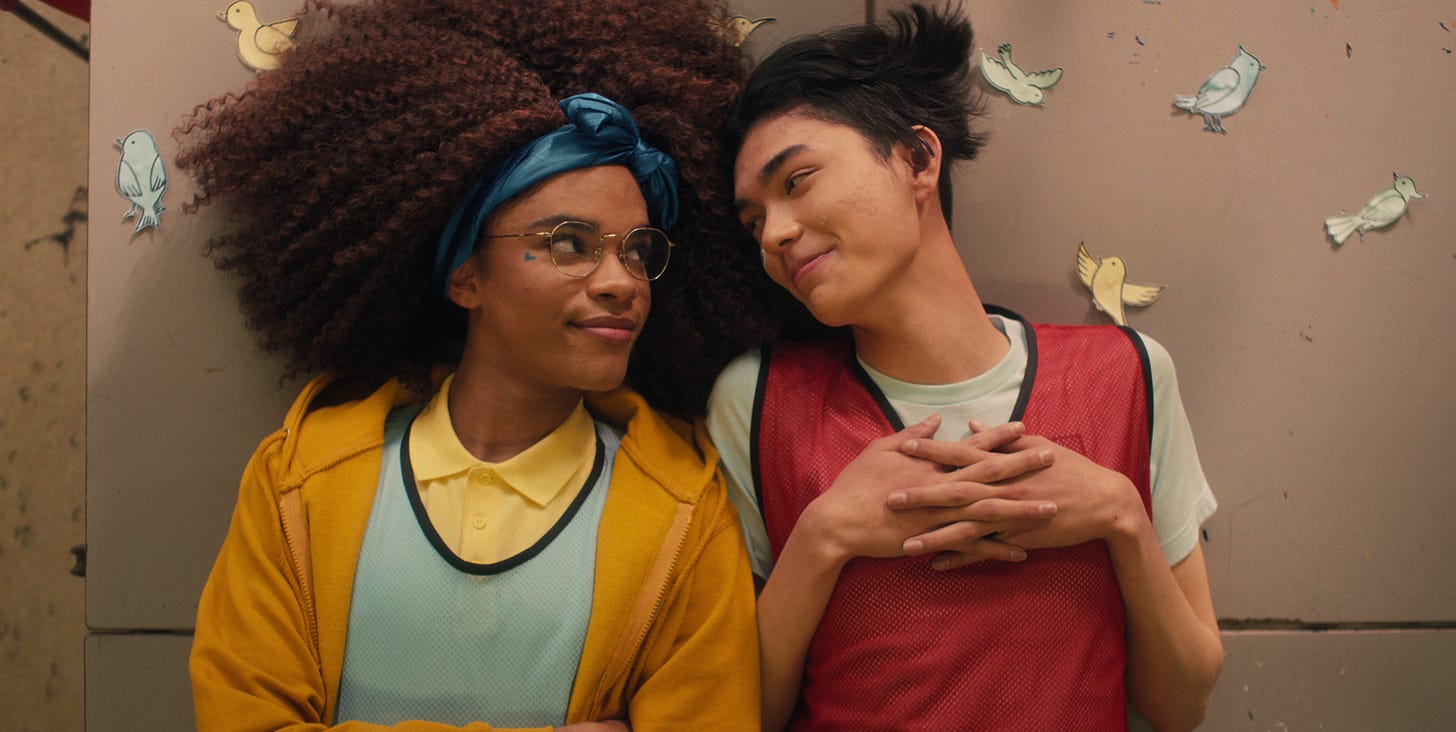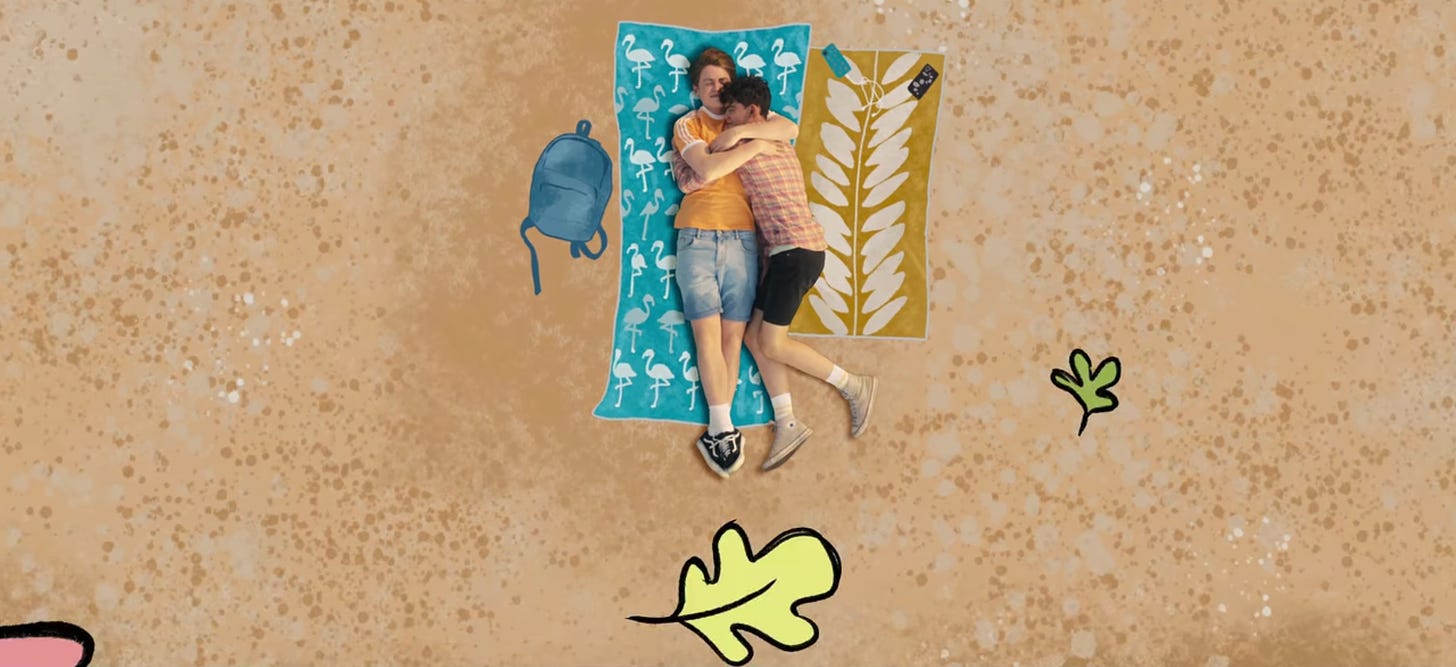Finale Review: Heartstopper, "Boyfriend" | Season 1, Episode 8
An optimistic but nonetheless grounded conclusion to the winning first chapter of this story
Heartstopper’s second volume ends in the same place as Heartstopper the TV show’s first season: after a day at the beach where Nick tells Charlie that he wants to come out and be boyfriends, he returns home and realizes the first step in that process is coming out to his mother.
It is, like all coming out scenes, inherently powerful: regardless of when it happened, every queer person who has come out recalls having to put into words something that they’ve felt deeply, knowing they’re giving up control to someone that they care about but also someone whose perspective on this topic is often impossible to know for certain. And unlike in the books, we’ve seen moments that would make Nick question his mother’s reaction: she’s obviously very supportive and lovely, but she also spoke of him finding a “girl” he liked so casually, and teased him about his obsession with Kiera Knightley. She never closed off the idea that he could be something other than straight, but she never actively opened the door to the alternative, making it inherently risky for him to knock on it at this moment.
As I anticipated the second the show revealed its casting, there is something transcendent about seeing a queer teen come out to Olivia Colman: once he reveals the truth, she welcomes him openly, and apologizes that he felt for a moment that he might not be able to share this with her. She doesn’t question the principle of bisexuality, but she asks about it to make sure that he’s not just holding onto the idea of being attracted to women in order to appease her (or anyone else). In adapting their own story, Alice Oseman has in some ways really heightened the story’s investment in the conflict and struggle that comes from simply existing as a queer person, but Nick’s coming out is—as in the book—a moment of hopefulness. This is the support structure that a queer teen needs, and brings Nick’s story—and the season as a whole—to an optimistic close.
As a pair of books, the first two volumes of Heartstopper are a narrative of transition: after starting as Charlie’s story exclusively, the endpoint is a huge life moment for Nick, and it’s really only then that it becomes his story as much as Charlie’s. The gravity of this moment for Nick in many ways seemed to dictate how his story was expanded within the television adaptation of these books: if this is going to be your climax to a discrete season of television, as opposed to the climax of a second book in a series, there needs to be the narrative throughline for it to feel like the final piece of that puzzle. But Nick’s wasn’t the only story that was expanded, and these last few episodes have had to generate a lot of new story developments to create a wider-ranging climax for not just the ensemble, but also Charlie.
The Truham-Higgs Sports Day is the solution to these problems, offering a great excuse to mend relationships, settle scores, and reflect on the past and future. Elle returns to Truham for the first time, re-entering spaces that were traumatic but she starts to see in a different light with Tao by her side (and seemingly starting to feel the same cartoon butterflies she is, even if this goes unspoken). Tao’s assignment to the 200m race gives Charlie a space to step up—and step in—for his friend, resolving the tension in the wake of Charlie’s choice to keep his relationship with Nick from him. Tara and Darcy share a public kiss after the former overcomes the contagious sprained ankles to make a successful high jump. Isaac throws a javelin to wild applause. With Stephen Fry’s voiceover as the Headmaster, it’s a charming high school story structure, with the right balance of whimsy and utilitarian narrative opportunities.
But as much as Sports Day ensures that “Boyfriend” serves the wider ensemble, the episode is still most focused on Nick and Charlie, with the latter’s story being the most significant departure from the books. While there has certainly been lots of ominous discussion about the state Charlie was in the year before, the extent of it really isn’t fully clear until his sister finds him drumming out his feelings, and he talks about his headspace surrounding Nick and Tao’s fights with Harry. We knew that the situation with Ben had damaged his sense of self-worth, but with Tori he goes so far as to suggest that “maybe it would be better if I didn’t exist.” The books don’t shy away from addressing Charlie’s struggles with mental health, but in the first volumes it is mostly spoken of in the past tense, without the type of triggering incidents that define these past few episodes.
Ultimately, Heartstopper has branded itself as a show about hope and positivity for queer youth, and so Charlie does indeed gain new perspective on his situation: he beats Ben in the 200m race and makes clear that his bullying doesn’t get to define his value, and while he spends much of the episode running away from Nick he ultimately accepts him as he abandons the rugby match to make a grand gesture and pull Charlie away. It’s a romantic moment, with Nick working hard to profess how much he cares about Charlie, and Charlie seeing and hearing the type of affection he didn’t think he deserved, and that he wouldn’t allow himself to hear. It transitions into the beach date that ends Volume 2, where Nick puts into plain words what should have been clear from the last ten times they made out: he’s bisexual, he wants to be with Charlie, and he wants to be his boyfriend.
It’s a romantic ending, capping off a well-told, complicated story about two queer teens with their own damage, and their own journey to the kind of day that makes you smile for two. But it isn’t the happy ending that it seems given how Charlie’s story was adjusted to foreground his mental health struggles: Nick still believes, as he told Tao, that it was his unwillingness to come out and make their relationship public that led Charlie to start avoiding him, and that he was the thing standing in the way of Charlie’s happiness. And while it’s true that this was triggering, and that Nick’s steadfast commitment to Charlie and his willingness to both see him and be seen with him is going to do a lot to help Charlie, Nick still doesn’t fully grasp the depth of Charlie’s pain, and that nothing he’s done—and maybe nothing he could do—will make that voice in Charlie’s head go away.
Oseman doesn’t present this as a ticking time bomb: Charlie is happy on that beach, and he has someone at his side who is clearly committed to protecting him and his happiness, and there’s no effort to turn this into a cliffhanger. If Heartstopper stops after a single season, it will have told the story the first volume promised: boy meets boy, boys become friends, boys fall in love. But while Oseman conspicuously brought forward Elle and Tao’s story and the friendship with Tara and Darcy from later books, the work in Charlie’s story was more gradual, and only really came to fruition in these final episodes. There was foreshadowing in these early books to the complicated nature of Charlie’s journey, but the season lays a much stronger foundation for telling that story in ways that I would be devastated to see unexplored.
Indeed, as much as Heartstopper’s message of positivity is uplifting, I would argue it is more powerful for how the subsequent journey for both Nick and Charlie points to the hard work of persistence in the face of adversity. This is never a story that frames queer people solely through the lens of victimhood or tragedy, but compared to the books the show invests more in the weight of living in a world where those realities exist, and where for Charlie and Elle they are still dealing with the weight of how they’ve impacted their lives. The adaptation might lose a bit of its edge in the fact that “teen TV” is honestly more restrictive as a genre than Young Adult fiction is, and Oseman had to cut f-bombs to keep things TV-14, but the idea that the story is told through rose-colored glasses has never rung true for me. Heartstopper is not a fantasy: it’s just telling a story about queer teens carving out a space for themselves, sheltered from but not immune to the pressures of the world they live in.
Achieving this is a delicate balance, and ultimately Heartstopper’s greatest accomplishment. In bringing the story to television, Oseman resists what would have been natural efforts to universalize the story: the very British setting stays, and there’s no addition of parent or student storylines that seem designed to presume adult or straight viewers need a surrogate into this story. The earlier introduction of Elle, Tara, and Darcy foregrounds the distinct experience of queer relationships, asking the audience to relate to their experience instead of trying to depict a world where equality has erased those differences. And while “Boyfriend” may be wistful and whimsical in how it approaches the idea of love and emotion, it—like the season as a whole—understands there are limits to its power, and beautifully caps off the season as a result.
Stray (Adaptation) Observations
So I know I made a whole (mostly sarcastic) stink about how they failed to cast a Giant to play Nick, and it reshaped all of the panels built around their size differential, but I will say that watching Kit Connor pick up Joe Locke like he was nothing and walk into the ocean sold that dynamic better than any of the other efforts.
I have to say that I feel Tao got away with not really having to apologize to Charlie, and I don’t love it? Like, he seemed to be ready to acknowledge that he had maybe misjudged how to help his friend, but moving him discovering the secret up to fuel the climax meant he forgot about that, and Charlie is the one who spends the episode apologizing for it until Tao kind of rushes out various apologies after the race. Of the character arcs that got extended, Tao’s felt most inflected by the needs of the plot at any given moment, and I don’t know if his landscape painting is enough to make me feel like my frustration with him was resolved. (I did chuckle at “No, I’m going to stay pissed at him a bit longer”).
Imogen isn’t a big part of sports day, but the camera lingers on her as Nick and Charlie abandon the rugby match, and she seems to connect the dots to her conversation with Nick. Would be interested to see how her allyship journey plays out in a second season.
Speaking of allyship, Isaac reading Gender Explorers before class? He is truly the “Valentina Ally” TikTok come to life. (I hope they get really into TikTok in Season 2).
Bringing forward Mr. Ajayi earlier made a lot of sense, as it both creates a way to explore the generational queer dynamic earlier and lets someone play Queer Yoda. That could have been overplayed, but they use it sparingly, and in ways that provide a good foundation for Charlie to come to terms with things on his own.
Sports Day is also an excuse to let Stephen Fry have some fun as the voice of the headmaster, which is again balanced well to be funny without being too absurd.
As I mentioned in the previous review, the biggest question mark for a second season for me is whether there is an effort to rehabilitate Ben. On some level having him stick around more gave him more time to be an asshole, but it also created more space to understand why and for even Charlie to be clear that it’s fine to be working through his own sexuality, just not at the expense of others. Whereas Harry spends Sports Day suspended, Ben has to sit reflecting on Charlie’s final verbal takedown, and I think there’s a path to tell his own coming out story if the show so desires.
So, there’s no equivalent moment to Nick abandoning a rugby game, going over to Charlie, holding his hand, and then running off with him in the books, so should there be a second season I’m curious how they handle the idea that they’re not yet out to their schoolmates? It’s a huge plot point of Volume 3, so interesting to understand how they decide to generate story accordingly.
A little sad that we didn’t get Nick’s “But Muuum” after she still insists Charlie can’t come to Menorca, but I realize that ending on the return to the image of them on the beach is the more fitting conclusion to the season. I just liked that little comic beat to disrupt the emotions of the moment.
If you’ve read this far, thanks for reading! I hope to have some additional reflections on the season with insight from Alice Oseman this coming week, and if you subscribe you’ll get my weekly newsletters, where I may be covering other shows you’re interested in in the future (I know I’ll at least have some thoughts on Love, Victor S3, for example).









I was a long-time AV Club reader (all the way back to Emily's Glee recaps) so the turn the site has taken in recent years has been disappointing. I saw that you were launching this substack but I didn't watch any of the initial shows so I held off. But the Heartstopper reviews were exactly in my wheelhouse and even though they were in front of the paywall they were worth the subscription even if it was just for those. (But I'm pretty sure I'll watch some of the new summer shows as well)
I hope you'll continue doing queer YA coverage when quality programs come out. And of course hopefully for S2 Heartstopper (though I've been burned by Netflix enough times to know there are no guarantees until it's official).
I'm late to the party but I just rewatched it (again, in one sitting as I just couldn't tear myself away). I'm biased in favor of queer stories, but I can only say Heartstopper is a masterpiece. Every element was firing full cylinder--the writing, pacing, casting, acting, costume and set design... On rewatch I spotted for the first time so many tiny details that just enhanced the story--blue and yellow iconography, a fleeting but telling look from a character.
And I'm beyond impressed with the two leads. I cannot believe two 17-year-olds turned in performances of such quality, vulnerability and thoughtfulness. Particularly Joe Locke in hist first professional job. He gives me Colin Morgan circa 2008 vibes--not merely because of his youth and physical resemblance, but from his raw talent. I look forward to future work from him and Kit Connor.
On a meta note, I discovered your Substack while reading everything I could get my hands on regarding Heartstopper. I too have missed AV Club's TV coverage, and now I know why! Your excellent episodic analysis was fantastic even reading it all after I'd seen the whole show. I was intrigued when I saw what other shows you plan to cover this year; then when I saw someone's reviewing Strange New Worlds, by far my most anticipated of the new Trek series, well, that sealed the deal. Thanks for your quality analyses!